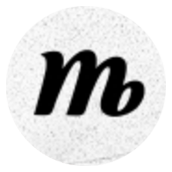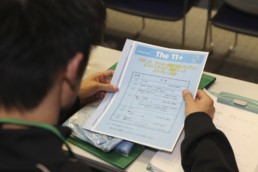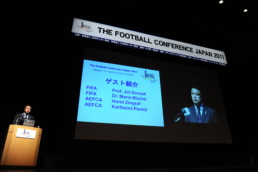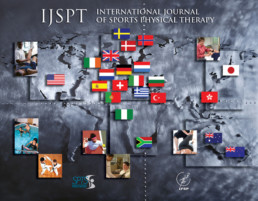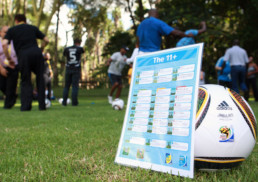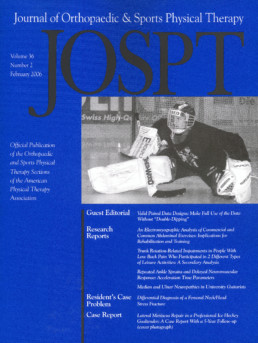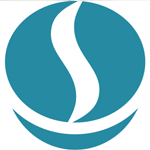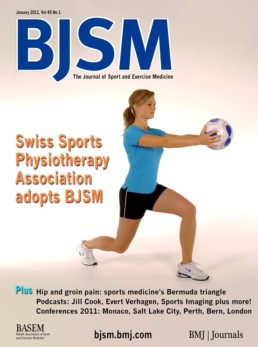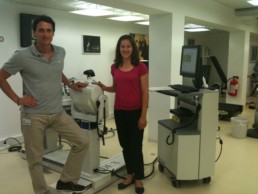11+ workshop, JISS, Tokyo, Japan
Januar 16, 2011
Thank to the cooperation of JFA, Dr. Toru Fukubayashi and Dr. Michiko Dohi (JFA Medical) we had a successfull one day 11+ workshop (11/1/11 –> note the numbers!) at the impressive facilities of the Japan Institute of Sports Sciences (JISS) in Tokyo. Mitsu Tsumaki, Keigo Nakajima and Toriu Taksumi –from the Tokyo College of Medical Sports ensured the organization and assistance during the workshop. There were in total 60 participants (fitness trainers, athletic trainers, physiotherapist, all working in football).
Japan Football Association Conference, Oita, Japan
Januar 15, 2011
Prof. Dvorak and myself were inivited to hold 2 presentations at the "Football Conference Japan" of the JFA (Japan Football Association), a biennial event with almost 1000 participants (all coaches from the japanese football leagues)(8-10/1/11). We discussed our 2 major projects: 11 FOR HEALTH and 11+.
IJSPT
Januar 11, 2011
The Sports Physical Therapy Section (SPTS) created the North American Journal of Sports Physical Therapy to address current physical therapy trends and practices to improve the care of the recreationally active individual.
It was designed as a benefit of membership for the Sports Physical Therapy Section of the American Physical Therapy Association. The first issue was released February 1, 2006. Beginning V4N1, the Journal became an online publication and all archives were posted on the NAJSPT website. Members and subscribers have immediate access to the publication and articles are available for purchase by non-members. Subscriptions are also available for non-members.
On January 1, 2011, the journal became the International Journal of Sports Physical Therapy, and serves as a benefit of membership for countries around the world. It is an official publication of the International Federation of Sports Physiotherapy.
The journal is currently indexed by PubMed, CINAHL and Sport Discus.
11+ Injury prevention programme
Januar 3, 2011
11+ is a complete warm-up programme to reduce injuries among male and female football players aged 14 years and older.
The programme was developed by an international group of experts and its effectiveness has been proven in a scientific study. Teams that performed the 11+ at least twice a week had 30-50% less injured players.
The programme should be performed, as a standard warm-up, at the start of each training session at least twice a week and takes around 20 minutes to complete. Prior to matches only the running exercises (parts 1 and 3) should be performed.
For all exercises, correct performance is of great importance. Therefore, the coach should supervise the programme and correct the players if necessary.
JOSPT & Swiss Sports Physiotherapy Association
Januar 2, 2011
The Journal of Orthopaedic and Sports Physical Therapy (JOSPT) is since 2 years one of the official journals of the Swiss Sports Physiotherapy Association (SSPA). SSPA members benefit fron free online access to JOSPT.
Schulthess Klinik
Januar 1, 2011
Status
- Ausbildungsklinik "A" in orthopädischer Chirurgie, "B" in Handchirurgie
- Swiss Olympic Medical Center
- FIFA Medical Assessment and Research Center (F-MARC)
- FIFA Medical Center
- Read more
BJSM & Swiss Sports Physiotherapy
Januar 1, 2011
Since 01/01/2011 the British Medical Journal of Sports Medicine (BJSM) and the Swiss Sports Physiotherapy Association (SSPA) has a partnership, which makes the BJSM one of the official journals of SSPA. SSPA members benefit from free online access to BJSM.
NRL @ Schulthess Klinik
Januar 1, 2011
The Neuromuscular Research Laboratory (NRL) was established as an independent unit of the Lower Extremity and Research departments at the Schulthess Clinic in September 2006. The original co-founders are Nicola Maffiuletti (Research department), Mario Bizzini (Research and FIFA F-MARC departments) and Urs Munzinger.
The principal activity of the Neuromuscular Research Laboratory is the evaluation of neuromuscular function in orthopaedic patients (e.g., hip and knee arthroplasty) and in sportsmen, with special emphasis on the plasticity of neural and muscular structures in relation to disuse, immobilisation, rehabilitation and physical training.
Internal as well as external funds (collaborative research grants and private companies/individuals) support the activities of the Laboratory. The Neuromuscular Research Laboratory has extensive collaborative projects with numerous groups throughout the world.
